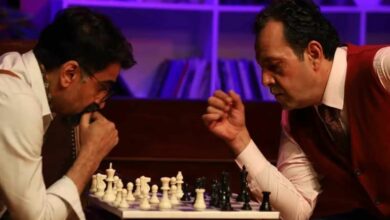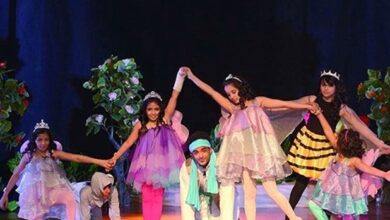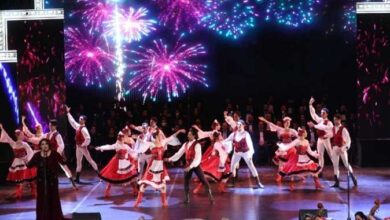Last Saturday at the Darb 17 18 the Oscarisma Studios performed two plays. The first, a pantomime, told the story of an alien abandoned on earth, where he is exploited and made to perform for humans. He dances like Michael Jackson and is involved in a fight scene. The show was charmingly chaotic and the mimes were good enough to make the whole audience laugh, especially the kids, to whom the show was directed.
Eventually, the alien's mother ship–played by a large woman with a big square box tucked under her shirt–returns to pick up the lost alien, but he has become so fond of the earthlings that he decides to stay. The odd character of the mother ship, suggesting pregnancy and motherhood with her square stomach and strange noises, was probably the best character in the play.
Sufi dancers performed between the first and second show, earning the usual cheers for their skillful dancing.
The second play, a reinterpretation of Czech-German playwright Milina Owda’s More Than a Sea, was more complex. This staging recounted the story of three siblings (the original script has only two), who tackle issues of mental illness, jealousy, and art. At first, we are made to think that the siblings live in a charming house by the sea. But all is not what it seems.
The two younger siblings enjoy a special relationship; the little sister, a painter dressed in bright pink, dances while enchanted by the guitar of the middle brother. But their relationship draws the ire and jealously of the eldest brother, played skillfully by Helal al-Hakmi. The brother is lame and ill, limping helplessly across the stage, ravaged by anger and bitterness, trying to stop his younger siblings from performing their art.
Jealous of his younger brother, he wants to be his sister's idol and tries to win her over by recounting his days as a captain sailing the seven seas. At one point, to illustrate his story, he drops his crutch and starts walking around unassisted, dressed handsomely in a red uniform and cap. “We wanted the audience to wonder, why does he not limp anymore? Was he faking all along to draw his siblings' sympathies and compassion? Is his handicap purely in his head?” said Oscar Nagdi, the director.
The play is purposefully unclear, and the audience is left wondering what is real until the last scene, guided only by the increasingly unreliable actions of the eldest brother.
"We do not tell anything directly to the audience," says Mahmoud Yehia, the art manager. "They must interpret it by themselves." In this way, the Oscarisma team managed to thrill the spectators with their passionate acting. "I tell my actors, when they go on stage, throw fire at the audience!" said Nagdi.
The director arranged for all the action to revolve around the little sister, a mostly silent character. But the most passionate discussions, and the focus of the play's core emotions, occur between the two brothers.
"I thought that something was missing from the original play, which is why I added a third sibling, to have two extremes revolving around one in between." It is an excellent catalyst for conversation between the two brothers, which leads up to a truly shocking and innovative ending.
The Oscarisma group concluded the evening by gathering everyone around the stage for a small singing performance. Some people danced, some people sang along, but even those standing still were visibly entertained.




